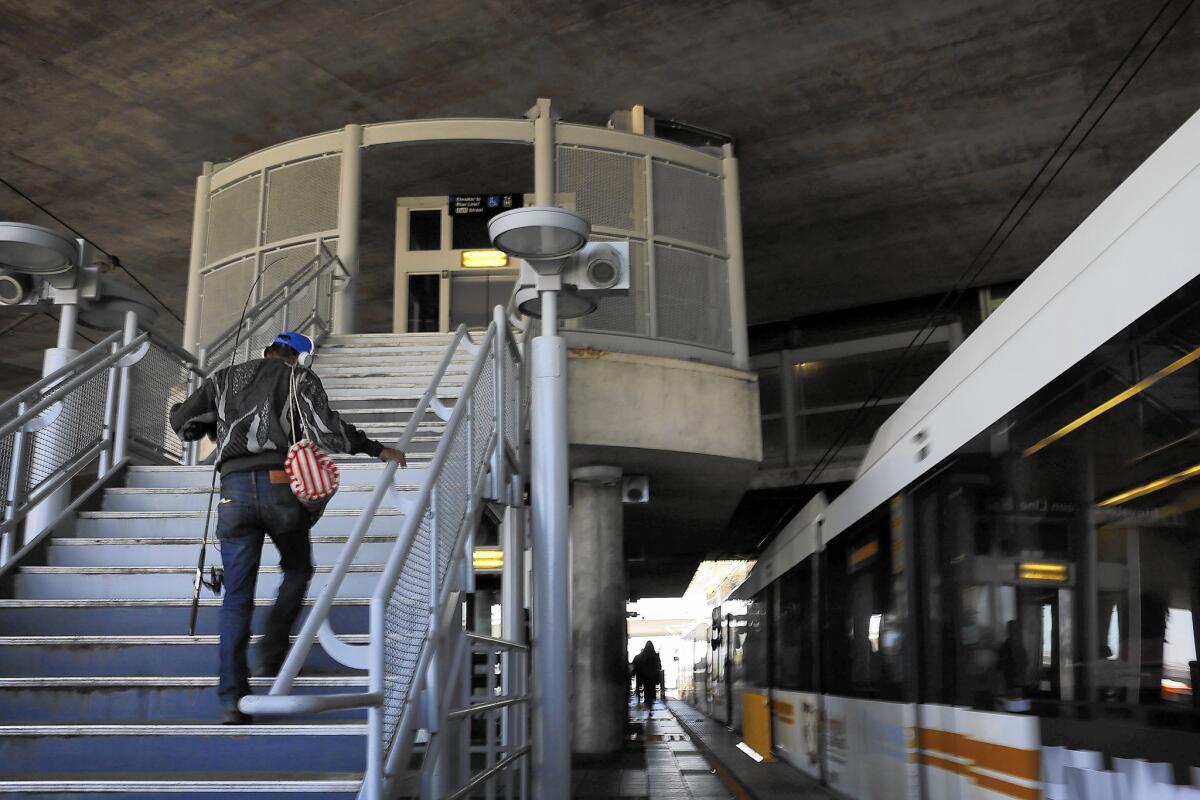California Commute: Reports of sexual harassment by Metro commuters could hinder efforts to boost ridership

As the Metro Red Line train whisked evening commuters toward Union Station, a repeated movement caught college student Amy Swart’s eye.
A scrawny, tattooed man in the opposite seat was staring at her, unblinking, his hand thrust into his unzipped fly.
“He was doing it completely in public, with this really crazy, creepy look in his eyes,” said Swart, 32. “There were people sitting in front of us, there were people in back of us … and no one said anything.”
See the most-read stories this hour>>
Swart is among the thousands of Los Angeles County commuters who say they have been sexually harassed on a bus or train in the last six months. Recent survey data from the Metropolitan Transportation Authority suggests nearly one in five riders — 19% — has experienced some form of harassment this year. Seven percent have been fondled or groped, and 8% have been subject to indecent exposure.
The data, from nearly 20,000 surveys handed out on Metro buses and trains, raises question about actual and perceived safety on Los Angeles County’s ever-expanding rail network. And, experts say, it could be a stumbling block for Metro as the agency works to coax Angelenos out of their cars and onto public transit.
The numbers are also troubling for the 78% of Metro riders who have no access to a car.
Although six in 10 Metro passengers are Latino, black passengers reported the highest rates of indecent exposure, physical contact and harassment overall. Riders younger than 34 reported the highest rates of harassment of all kinds. Passengers younger than 18 reported the highest rate of unwanted touching of any age group.
Officials acknowledge the problem, but they say they are making progress. Metro has seen a three percentage-point decrease in the rate of riders who reported sexual harassment, down from 22% last spring. Officials credit a public awareness campaign called “It’s Off Limits,” which urges passengers to report harassment by calling (888) 950-7233.
Officials note that the latest numbers are significantly lower than rates reported in other big cities around the world. A 2007 poll of New York City subway riders found 63% had experienced some form of harassment. Recent polling by the Thomson Reuters Foundation indicates rates are higher still in other countries.
But a 19% rate doesn’t necessarily mean that only one in five passengers experiences harassment, said Genevieve Berrick of Hollaback, a nonprofit aimed at preventing such behavior. The gap between Metro’s data and other world cities suggests that many L.A. transit riders either don’t understand what sexual harassment looks like or have become accustomed to it, Berrick said.
“I’d love to think that riding Metro is a less difficult experience than it is in other cities,” Berrick said. “But the data is actually a little concerning.”
After launching a public awareness campaign like Metro’s, agencies should see a short-term spike in riders reporting harassment in surveys and to law enforcement, Berrick said.
In 2014, the Sheriff’s Department received 99 reports of indecent exposure and physical and verbal harassment — a fraction of the thousands of incidents reported during Metro’s survey period. County Supervisor Sheila Kuehl, who also serves on the Metro board, called the reporting rate “woefully low.”
Some victims of sexual harassment may not file reports because they feel ashamed, or because they don’t remember many details, said Patti Giggans, the executive director of Peace Over Violence, an assault prevention nonprofit working with Metro. Others are reluctant because they’re in a hurry to get to class or work, and making a report takes time.
In other cases, she said, even a brief contact with another passenger could trigger painful memories of childhood abuse or sexual assault.
Victims who come forward need to know they will be treated with respect and care, Giggans said. “You don’t want someone to dismiss you, or talk to you abruptly, or try to get you off the phone,” Giggans said.
Metro has a smartphone app, Transit Watch, that helps people call sheriff’s deputies, confidentially report harassment and snap photos of an incident. But only 6 in 10 Metro riders own a smartphone.
If more reports were made, the agency would have a clearer picture of harassment hot spots or problem areas within the system, Metro spokesman Paul Gonzales said. Reports from victims and eyewitnesses can help officials find patterns, particularly for serial harassers, who may take the same bus route every day, just like other commuters.
In the last three months, Metro has begun training its 11,000 employees to handle reports of sexual assault or harassment. Someone who has just been through that experience will probably talk to the first uniformed person they see, Gonzales said, even if it’s a janitor or a ticket-taker.
Stationing a uniformed deputy on every train car or bus would be prohibitively expensive, and essentially impossible, officials say.
But Pam Noles, 40 of Alhambra, says she wishes one had been around late one night as she rode a southbound Red Line train from North Hollywood. A group of young, drunk men boarded in Hollywood, she recalled. One said, “Hey baby,” and put his hand on her breast. When she yelled and cursed, he asked her why she was so uptight.
Noles said she didn’t report the assault because by the time an officer came, the men would be long gone.
She added that she didn’t see any uniformed officers and didn’t have cellphone reception in the train tunnel. If Metro “had officers on the lines, or at every station, or every other station,” she said, “then I would have probably reported what happened.”
For any passenger who is experiencing harassment, Giggans recommends “making a fuss.”
“You shouldn’t be embarrassed,” Giggans said. “These things sometimes happen because they’re happening in secret. Even loudly saying, ‘Hey, take your hands off me’ or ‘Stop doing that’ can go a long way.”
Swart, the Los Angeles Community College student, tried to do that with the man seated across from her with his hand thrust in his pants. She loudly told him to stop. He responded: “Yeah, I know. It’s stupid, right?”
Swart and a classmate moved to the other side of the train, and the man followed. Other passengers looked over, she said, but didn’t do anything. They got off at the next stop and boarded a different car.
When the train reached Union Station, a security guard pointed her to two uniformed Metro employees, who said they would have to find a sheriff’s deputy to help her. As they searched, they told her that filing a report would be “useless” without the number of the train car she’d been in.
Confused and frustrated, Swart left. Now, she carries pepper spray in her purse when she takes the bus or train.
“The whole process was so disheartening,” Swart said. “Everyone wanted to direct me to someone else. They have people to check to see if your fare is paid, to make sure they get their money, but they don’t actually care about what happens.”
Follow @laura_nelson for transportation news
Have an idea, gripe or question? Times staff writers Laura J. Nelson and Dan Weikel write California Commute and are looking for leads. Please send them along.
ALSO:
Fight between homeless men outside Disneyland ends in stabbing
Group of black women kicked off Napa wine train after laughing too loud
Man dies after being run over by WWII tank on Jelly Belly chairman’s property
More to Read
Sign up for Essential California
The most important California stories and recommendations in your inbox every morning.
You may occasionally receive promotional content from the Los Angeles Times.










